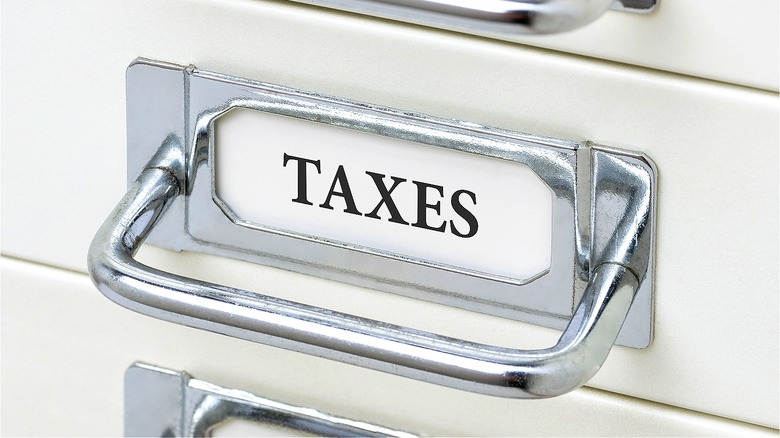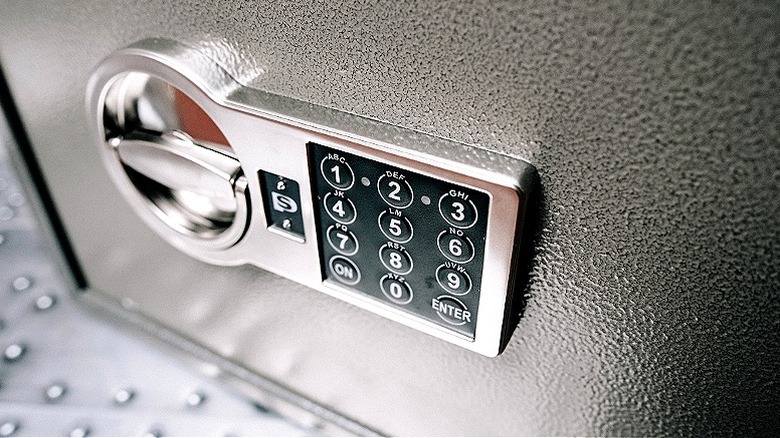This Is The Safest Way To Store Your Tax Returns
We may receive a commission on purchases made from links.
If you've ever wondered how long you should hang on to your old tax documents, three years is the recommended time frame in most circumstances, but that can stretch out to six years, seven years, or even indefinitely in certain more complicated situations. Also note that we said "tax documents," not just tax returns. That's because, in addition to your tax returns, you should also save any statements or receipts used to prepare the tax returns, such as 1099 forms, W-2s, or anything used for itemized deductions, to name a few.
While it's true that the IRS does make certain tax records available for prior years by request, those transcripts won't typically include the personal documents you or your tax preparer used to create the tax return. Worse still, if the information you're seeking is more than three years old, you'll receive a less-detailed tax account transcript in lieu of the actual tax return, so it's definitely worth maintaining your own set of records. Suffice to say, these documents should be stored in a safe place where they won't accidentally get lost or discarded, but you also might consider protection from fire or water damage.
A fireproof safe is a classic option
A small fireproof safe is a popular storage option for tax documents, as well as other important papers like vehicle titles, birth certificates, and more. When the word safe is mentioned, you might picture a bulky steel wall- or floor-mounted affair with a combination dial, but that's overkill for safekeeping tax returns.
Instead, the big-box stores and online retailers carry small fireproof safe boxes with a keyed lock, starting around $40 for reputable brands (for example, Amazon has a 14.3-inch-wide safe box from Sentry for $39.99). They're typically large enough for a healthy stack of documents with room to spare for a few other small items like jewelry or digital storage devices. Many small safes are also waterproof to protect against plumbing leaks, flooding, or a dousing of water from firefighters.
For taxpayers who are more concerned with protecting important documents from damage rather than theft or unauthorized access, an alternative to a small safe box exists with a variety of bags and pouches, which are even more compact, and more economical as well. Fireproof bags, available at retailers like Walmart, might also appeal to those who don't want to keep track of an extra key or numeric combination for a lock.
Keep digital copies of documents instead
With this said, even fireproof boxes and bags can't withstand intense heat for prolonged periods of time without failing, so also consider backing up your tax returns and other documents electronically. For some taxpayers who abhor paper, backing up your tax returns digitally can be a primary plan of action, too, since the IRS does accept digital copies of documents, so long as they're legible.
For those reasons, consider archiving documents with a desktop scanner, a mobile scanning app, or even a high-resolution digital photo. The scanned documents can be stored on a portable device like a flash drive, but that device may be subject to the same damage as the original documents if tragedy strikes. Instead, keep the documents in cloud storage, like Google Drive. In any case, do encrypt the files with a password so they can't be accessed in the event of a data breach.
Finally, if you need a copy of an old tax return that wasn't saved, fret not, it may still be available. The IRS provides taxpayers with transcripts of past tax returns for up to three years via phone, mail, or online. If you need tax information older than three years, a more basic tax account transcript — which includes information like taxable income and filing status — is available for the current year and up to nine years prior. Transcripts are free of charge, but for a fee, you could request past tax returns (via Form 4506) for the current tax year and the seven years prior.


